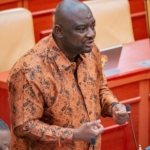General
Mpraeso MP: AT and Telecel merger: A commendable step, but the hard truth remains
I recently commended the government on the radio for addressing challenges in Ghana’s telecom sector by announcing the merger of AT Ghana and Telecel, formerly Vodafone Ghana. In a market where MTN controls nearly 79 per cent of mobile subscriptions, with over 21 million out of about 27 million u...
MyJoyOnline
published: Sep 06, 2025


I recently commended the government on the radio for addressing challenges in Ghana’s telecom sector by announcing the merger of AT Ghana and Telecel, formerly Vodafone Ghana.
In a market where MTN controls nearly 79 per cent of mobile subscriptions, with over 21 million out of about 27 million users, consolidating weaker players looks at first like a bold attempt to create balance and protect consumer choice.
Yet beyond this commendation lies a sobering reality. Unless the merger is managed with a clear strategy, it risks consolidating weakness instead of building real strength.
Market Reality
By late 2024, AT’s share had dropped below 8 per cent, while Telecel held around 18 per cent. On paper, their merger suggests a combined 26 per cent. Most subscribers already use dual SIMs with MTN as the main line. Folding AT and Telecel together does not create new competition. The numbers may suggest one plus one equals two, but the reality is closer to one plus one equals one point one.
The Illusion of Scale
Real economies of scale do not come automatically with size. They come from restructuring, integrating systems, rationalising networks, and cutting duplication. Without these steps, the merger risks piling inefficiencies and postponing the tough reforms needed to make the new operator competitive.
The Employment Question
The government has assured the public that all staff will be retained. This assurance is understandable, and workers naturally want job security.
However, protecting jobs in the short term must go hand in hand with ensuring the company’s survival in the long term. If the business remains weak, then every job is ultimately at risk.
Therefore, the focus should be on building an efficient and sustainable company. This does not always mean job cuts.
It can mean retraining and redeploying staff into new areas such as digital services, the NGIC-led 5G rollout, and customer experience. In this way, workers are not only retained but repositioned to secure the future of the business.
Competition Still Skewed
Even after the merger, MTN remains overwhelmingly dominant. Unless the new entity introduces genuine innovation and competitive pricing and aligns with national projects such as the Next-Gen Infrastructure Company (NGIC) rollout of shared 4G and 5G networks, it cannot seriously challenge MTN’s market power. Ghana risks ending up with one giant operator and two fragile challengers, which is not the competitive balance that regulators intended.
The creation of NGIC was one of the government’s boldest policy moves in recent years. It aims to build a nationwide 4G and 5G network as a neutral host platform that every operator can access on equal terms. If appropriately implemented, NGIC can lower costs, avoid duplication, and extend fast broadband even to rural communities.
For this model to succeed, all operators must be on board from the start, especially MTN, the largest player. Excluding MTN weakens the neutral host principle, creates unfair advantages, and undermines the efficiency gains the government intended.
Any delay in onboarding MTN will lead to duplicated networks, higher consumer prices, and a slower rollout of 5G. This would run against the vision of Digital Ghana 2030.
The Ministry must therefore act quickly to clear any regulatory, administrative, or contractual hurdles preventing MTN’s full participation in NGIC. Securing this alignment will protect policy credibility, guarantee efficient spectrum use, and deliver the intended benefits for the industry and the public.
A Missed Sequencing
A stronger approach would have been to stabilise AT and Telecel individually first. That would mean ringfencing their subscriber bases, upgrading to full 4G and 5G through NGIC’s shared rollout, and integrating them into national infrastructure schemes.
Once they had achieved operational strength, a merger could have created a genuine alternative to MTN. Instead, Ghana has fused two struggling operators without fixing their structural weaknesses.
Conclusion and Parliamentary Oversight
The intentions behind this merger are honourable, and the government deserves credit for acting. However, this move alone will not rebalance Ghana’s telecom market.
The merger must be backed by a clear restructuring plan that covers cost efficiency, system integration, and service benchmarks, while NGIC must be strengthened as the backbone of fair competition.
We await full details of the transaction so that the House can scrutinise its implications for competition, consumer welfare, and the long-term health of Ghana’s telecom sector. If we fail to confront these realities, the ultimate losers will be the Ghanaian people, who deserve affordable data, reliable service, and genuine competition in our telecom sector.
Read More